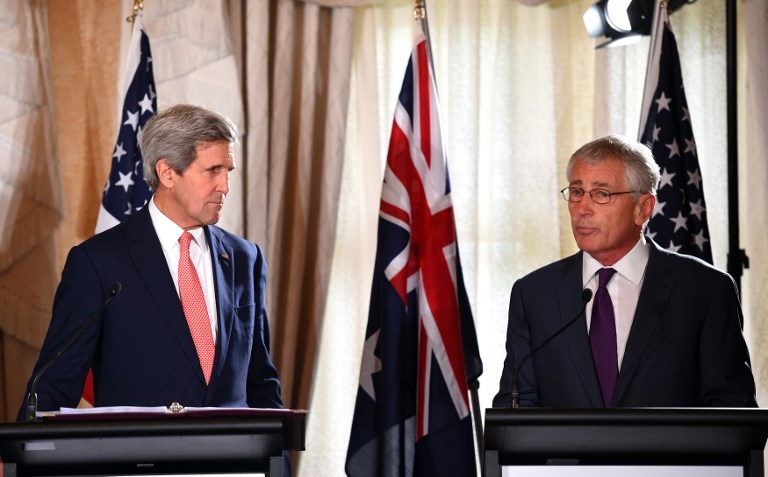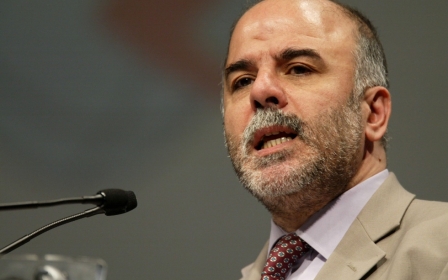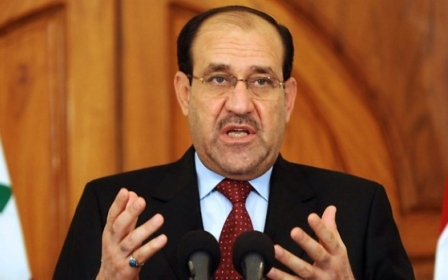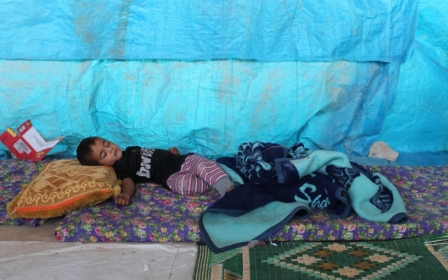Kerry calls for inclusive Iraq government

US Secretary of State John Kerry on Tuesday urged Iraqi prime minister-designate Haidar al-Abadi quickly to form an inclusive government, while ruling out sending US combat troops to the country.
"We are urging him to form a new cabinet as swiftly as possible and the US stands ready to support a new and inclusive Iraqi government and particularly its fight against ISIL," he said after annual security talks in Australia.
"Let me be very clear, we have always wanted an inclusive government that represents... all Iraqis. That is the goal."
He added that it was important "the forces of Iraq are not a personal force defined by one particular sect and sworn to allegiance to one particular leader, but they truly represent Iraq and Iraq's future in a broad-based sense".
"And I think that everybody understands that is the direction we have to go," he said.
"Nobody, I think, is looking towards a return to the road that we've travelled.
"What we are really looking for here is a way to support Iraq, to support their forces - either training or equipment or assistance of one kind or another - that can help them to stand on their own two feet and defend their nation."
Iraq moved closer to ending Nouri al-Maliki's stubborn grip on power as prime minister on Monday when his own political clan spurned him for Abadi. Maliki's Dawa Party rejected the nomination of rival Haider al-Abadi as the new Iraqi prime minister however.
Abadi, a Kurd long considered a close Maliki ally, has 30 days to form a government, amid hopes that a broad-based cabinet could serve as a foundation for healing Iraq's deep sectarian divides.
While the US has been conducting air strikes against extremist Islamic State militants in northern Iraq, Kerry said combat troops would not be sent in.
"There will be no reintroduction of American combat forces into Iraq. This is a fight that Iraqis need to join on behalf of Iraq," he said.
But the United States is helping ship weapons to the Iraqi Kurdish forces battling an advance by the militants, the State Department said. The Islamic State was previously known as ISIL.
US aircraft have also been airdropping aid to refugees from the Yazidi religious minority who are trapped on a mountain in northern Iraq, surrounded by extremists from the Islamic State.
US Defense Secretary Chuck Hagel said the Iraqi government requested the help.
"As you know, it was the Iraqi government that requested the US assistance with humanitarian delivery," he said in Sydney.
"We agreed with that request. We are carrying out those missions.
"It was also the Iraqi government's request of the United States to assist them with transporting military equipment to Erbil to help the Peshmerga (Kurdish fighters)."
He added that the military equipment being shipped was Iraqi.
"We are - American forces, through CENTCOM - are helping get that equipment to Erbil."
US airstrikes continue
While Kerry urged the formation of a new inclusive Iraqi government, the US continued its aerial bombardment of Islamic State militants Monday, targeting vehicles and checkpoints belonging to the group in northern Iraq.
Three checkpoints, one armed personnel carrier, one Humvee, two armed trucks, and another Islamic State truck were destroyed, according to the US Central Command. A fourth checkpoint was damaged during the airstrikes.
They were carried out from roughly 17.10 GMT to 20.30 GMT by US fighter jets.
An additional Islamic State checkpoint was damaged in a strike.
US President Barack Obama authorised the US military to carry out airstrikes on the Islamic State last week in support of US personnel in the northern Iraqi city of Erbil, and forces in Iraq.
On Saturday, Obama warned it was "going to take some time" to help stabilise Iraq in the face of the insurgency.
The violence in Iraq escalated in early June after a coalition of armed groups linked to the Islamic State, formerly known as the Islamic State of Iraq and the Levant, or ISIL, took control of large swathes of the country's predominantly Sunni provinces.
The Iraqi army has staged military operations against IS-led militants.
Over a million civilians have been displaced so far amid the ongoing clashes in the north and west of the country.
New MEE newsletter: Jerusalem Dispatch
Sign up to get the latest insights and analysis on Israel-Palestine, alongside Turkey Unpacked and other MEE newsletters
Middle East Eye delivers independent and unrivalled coverage and analysis of the Middle East, North Africa and beyond. To learn more about republishing this content and the associated fees, please fill out this form. More about MEE can be found here.




